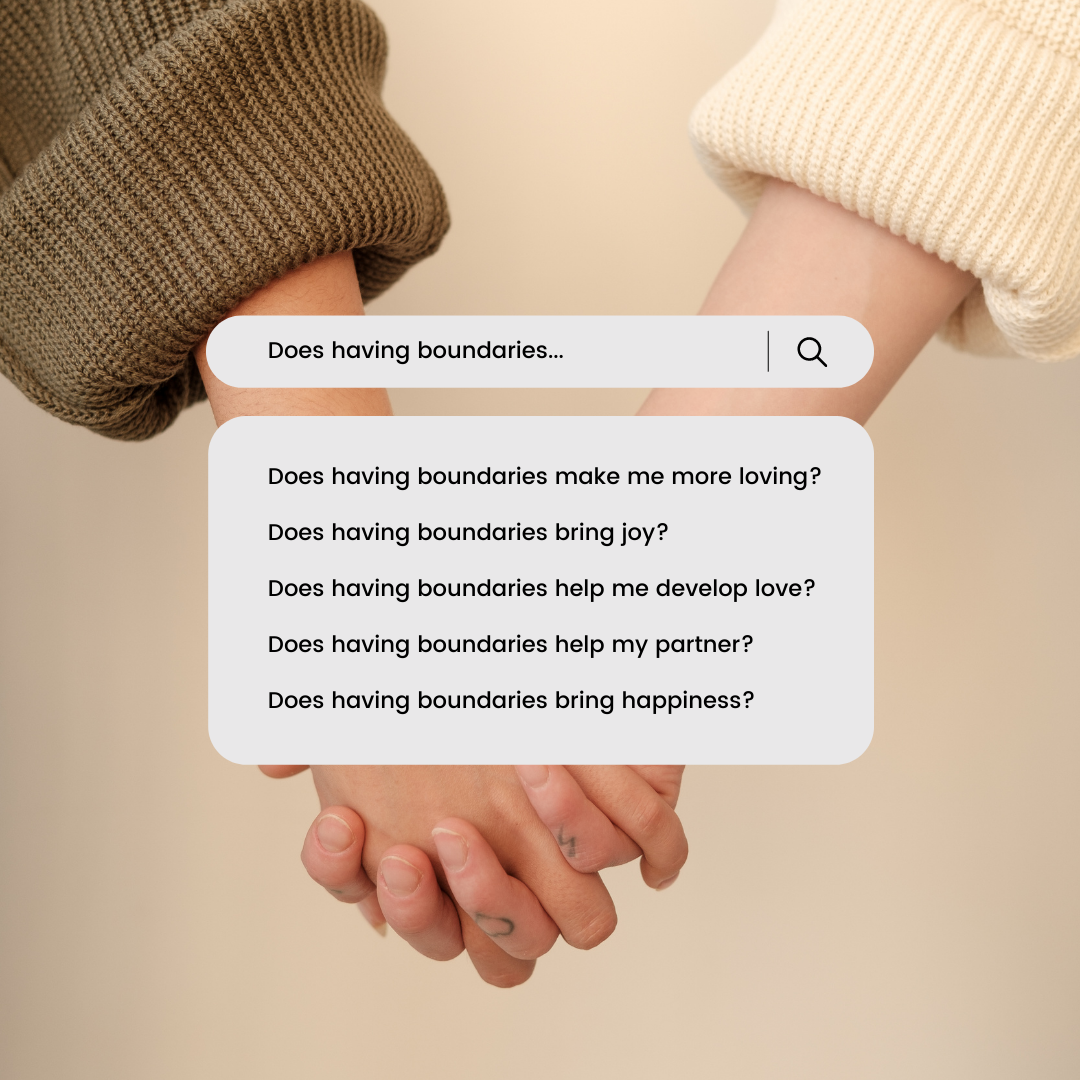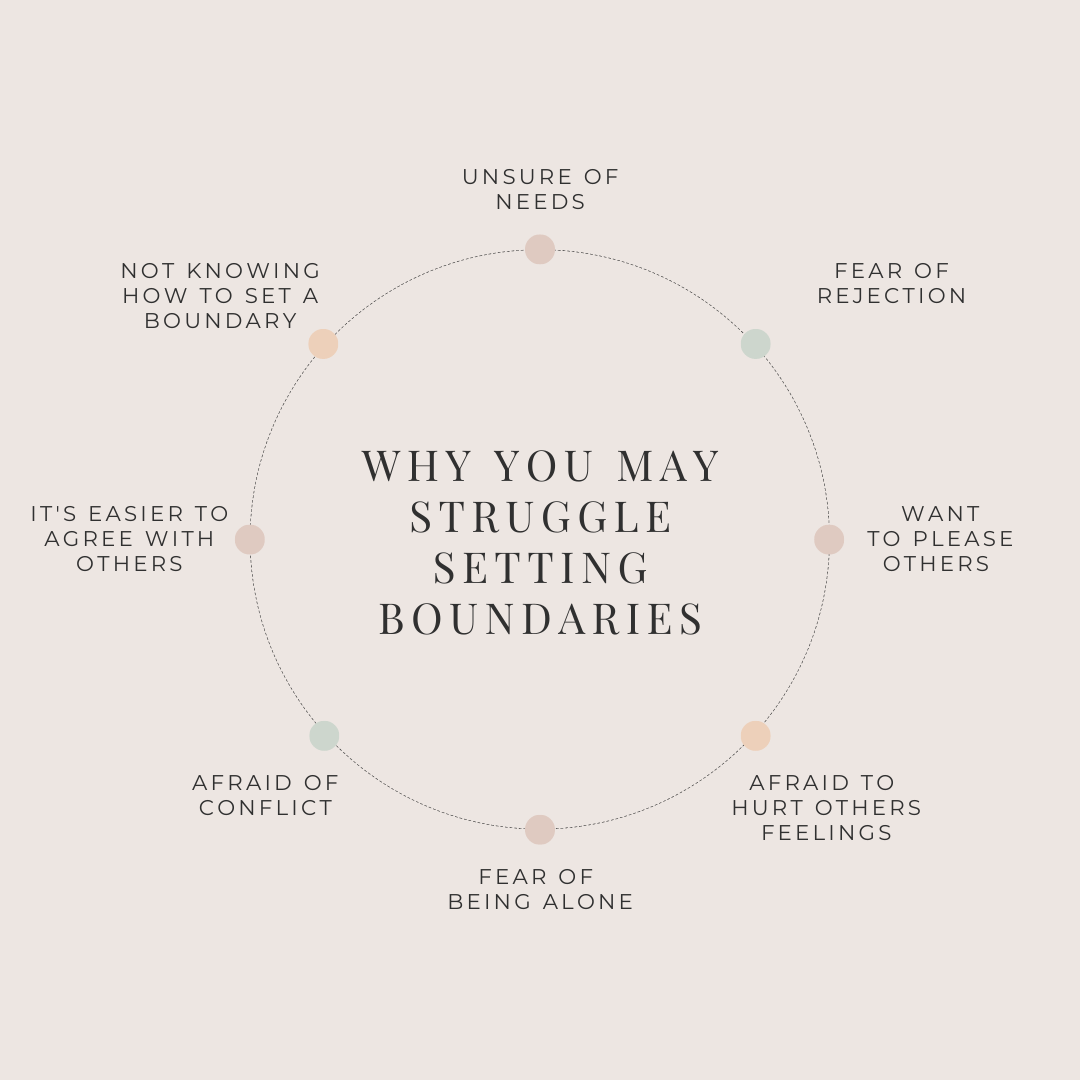Love with Boundaries

When you picture someone saying “No,” what is the image that comes to mind? How do you feel towards that person? Do you perceive them as likeable or unlikable? Desirable or undesirable? If your image looks something like an uptight, shrewd-looking woman who has harsh posture and tone and is unapproachable, you’re likely not very comfortable with setting boundaries. But, what if…saying “No,” and having boundaries is a very loving thing to do?
Boundaries can be one of the best ways we can love others and feel loved by others. Dr. Henry Cloud and Dr. John Townsend, authors of the book, Boundaries: When to Say Yes, How to Say No to Take Control of Your Life, suggests, “Those people in our lives who can respect our boundaries will love our wills, our opinions, our separateness. Those who can’t respect our boundaries are telling us that they don’t love our nos. They only love our yesses, our compliance. 7”. Brené Brown also stated, “When we fail to set boundaries and hold people accountable, we feel used and mistreated4.” Boundaries are aimed at managing expectations in relationships. Resentment and strain on relationships often result from a mismatch in expectations and reality.
Boundaries keep us from feeling resentful towards the people we love. Do you ever have the thought, “When do I get to come first?” When you heard the rational for why one must put their own mask on first in an airplane malfunction (to have enough oxygen to then attend to others), did you secretly think, “I could do it. I love my people enough that I could go without oxygen long enough to save them?” If your answer is yes, you’re not alone. It’s likely that you are often feeling taken advantage of, that you give more to others than they give to you and that you’re rapidly approaching (or arrived at!) burnout and resentment.
Boundaries clarify expectations so people know how to best love us, and we know how to best love them. In an interview, repeat bestselling author and researcher Brené Brown said, “I assumed for the first 35 years of my life that people were sucking on purpose just to piss me off. That’s what I assumed that whether it was someone who works for me or a family member who was constantly critical and judging and I was like why are they choosing these things, why are they making those choices? They should know better …7” Brené explains that it was difficult for her to consider that people were “Just doing their best” when it seemed others were consistently letting her down. Boundaries give individuals a road map to our heart and by telling them what we expect and need. It also allows others to know where we are on the road map of their heart by telling them what we’re willing to do and what we are not willing to do.
Boundaries allow us to be more compassionate in relationships . Perhaps many of us got the wrong message about how to best love and get love. Most individuals get the message early on in life that the best way to love people is to be selfless and give of themselves, even when they don’t feel there is anything left to give. In decades of research on healthy relationships, researcher Brené said, “One of the most shocking findings of my work was the idea that the most compassionate people I have interviewed over the last 13 years were also the absolutely most boundaried. 8”
Why would the most compassionate people in healthy relationships also be the most boundaried? Because boundaries are the language we speak when teaching people how we want to be treated and how we plan to treat them. See, we want to be able to assume good intent. We want to believe and respond as if people are doing the best they can. But, as Brené says in the same interview, “Generosity can’t exist without boundaries.” To be able to have the most generous assumptions about the people we are about, we must have boundaries8”. Boundaries create safe compassion.
Boundaries help us bring our best self into the relationship. Boundaries help us have integrity. Boundaries ask the question, “What boundaries do I need to have in place for me to be able to stay in my integrity and be able to make the most generous assumptions about you?’8 Boundaries require accountability which in turn helps us maintain and not sacrifice our own needs, values, and desires.
As a summary, we’ve considered how boundaries keep us from resentment and burnout in relationships, how they allow us to clarify expectations in relationships to best get our needs met and meet the needs of others, and how boundaries help us be more compassionate and bring our best selves to the relationship. Now that you’ve gotten over the idea that setting boundaries is mean and you’re starting to consider if having boundaries may make you more compassionate and generous, let's review the reasons setting boundaries makes you a more loving person:
 7 reasons setting boundaries can make you a more loving person
7 reasons setting boundaries can make you a more loving person
- Boundaries tell people who we are. They define who we are, and what we like and don’t like.
- Boundaries make it more likely for us to accomplish what is important to us.
- Boundaries help us avoid giving more than we have to give which leads to resentment. Boundaries prevent resentment.
- Boundaries prevent people from using us
- Boundaries make it more likely to meet our needs by telling them what we expect from them.
- Boundaries promote respect and accountability which is loving to others.
- Boundaries keep people safe
If you’re on board, but not sure where to start, it can help to identify the reasons you personally may struggle to set boundaries. There are many distinct reasons we get anxious and would rather give up ourselves than set limits for others.
9 reasons you may struggle to set boundaries:
- You believe not having boundaries will make you more likeable
- You have learned to get love by pleasing others
- You’re afraid of hurting other people’s feelings or fearing their reactions.
- You were taught that you loved being dependent on others.
- You’re afraid of rejection or being alone.
- You tend to take responsibility for others.
- You don’t like or are afraid of conflict.
- You aren’t used to getting your needs met and are unsure about what you want, so it’s easier to just agree.
- Your boundaries were disrespected or violated as children and positive boundary setting was not modeled or you.
Are you ready to get started? One way to begin setting boundaries is to identify the areas of your relationship that may need boundary-setting. One way to further clarify this is to take The RELATE Assessment. The RELATE Assessment looks at 10 major aspects of relationship wellness. Your report includes discussion questions and online that can help you identify areas where boundaries may be needed. Stay tuned for blog post #2 highlighting how to effectively implement boundaries. In the meantime, you can consider couples counseling (information on the blog). Here’s to bringing our best selves into our relationships and being the most loving people, we can be.

